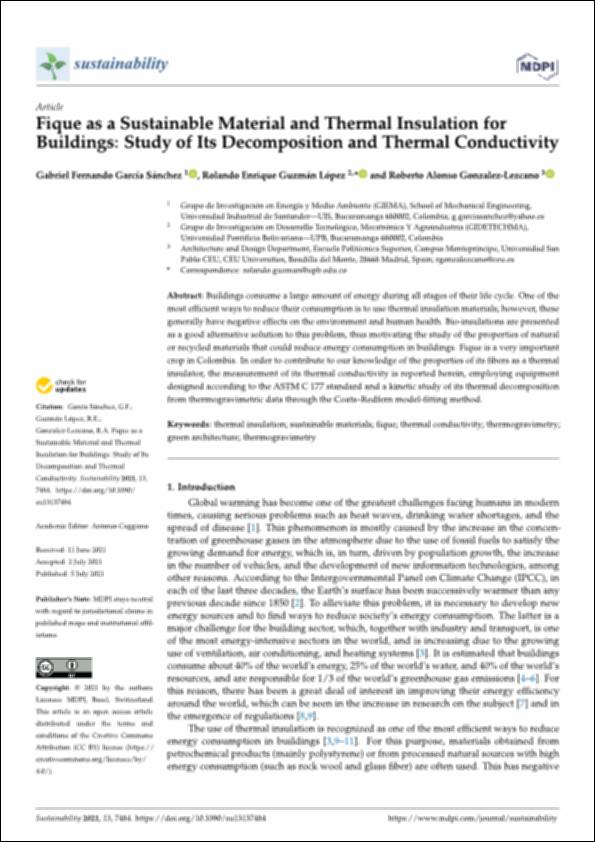Por favor, use este identificador para citar o enlazar este ítem:
http://hdl.handle.net/10637/14587Fique as a Sustainable Material and Thermal Insulation for Buildings Study of Its Decomposition and Thermal Conductivity
| Título : | Fique as a Sustainable Material and Thermal Insulation for Buildings Study of Its Decomposition and Thermal Conductivity |
| Autor : | García Sánchez, Gabriel Fernando Guzmán López, Rolando Enrique González Lezcano, Roberto Alonso. |
| Materias: | Sustainable materials; Thermogravimetry; Green architecture |
| Editorial : | MDPI |
| Citación : | García Sánchez, G.F.; Guzmán López, R.E.; Gonzalez-Lezcano, R.A. Fique as a Sustainable Material and Thermal Insulation for Buildings: Study of Its Decomposition and Thermal Conductivity. Sustainability 2021, 13, 7484. https://doi.org/10.3390/ su13137484 |
| Resumen : | Buildings consume a large amount of energy during all stages of their life cycle. One of the most efficient ways to reduce their consumption is to use thermal insulation materials; however, these generally have negative effects on the environment and human health. Bio-insulations are presented as a good alternative solution to this problem, thus motivating the study of the properties of natural or recycled materials that could reduce energy consumption in buildings. Fique is a very important crop in Colombia. In order to contribute to our knowledge of the properties of its fibers as a thermal insulator, the measurement of its thermal conductivity is reported herein, employing equipment designed according to the ASTM C 177 standard and a kinetic study of its thermal decomposition from thermogravimetric data through the Coats–Redfern model-fitting method. |
| URI : | http://hdl.handle.net/10637/14587 |
| Derechos: | http://creativecommons.org/licenses/by-nc-nd/4.0/deed.es OpenAccess |
| ISSN : | 2071-1050 |
| Fecha de publicación : | 5-jul-2021 |
| Centro : | Universidad San Pablo-CEU |
| Aparece en las colecciones: | Escuela de Politécnica Superior |
Los ítems de DSpace están protegidos por copyright, con todos los derechos reservados, a menos que se indique lo contrario.


